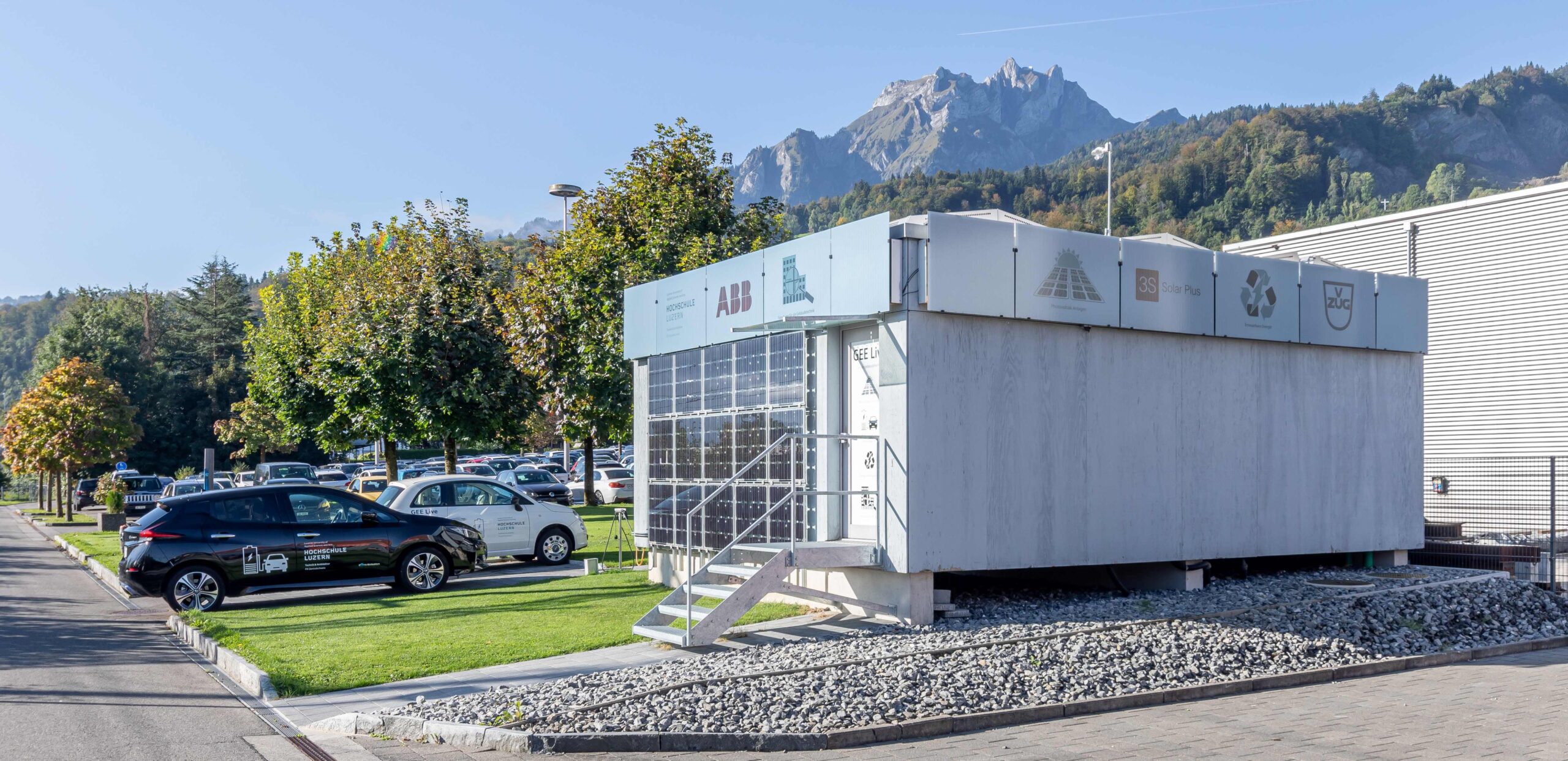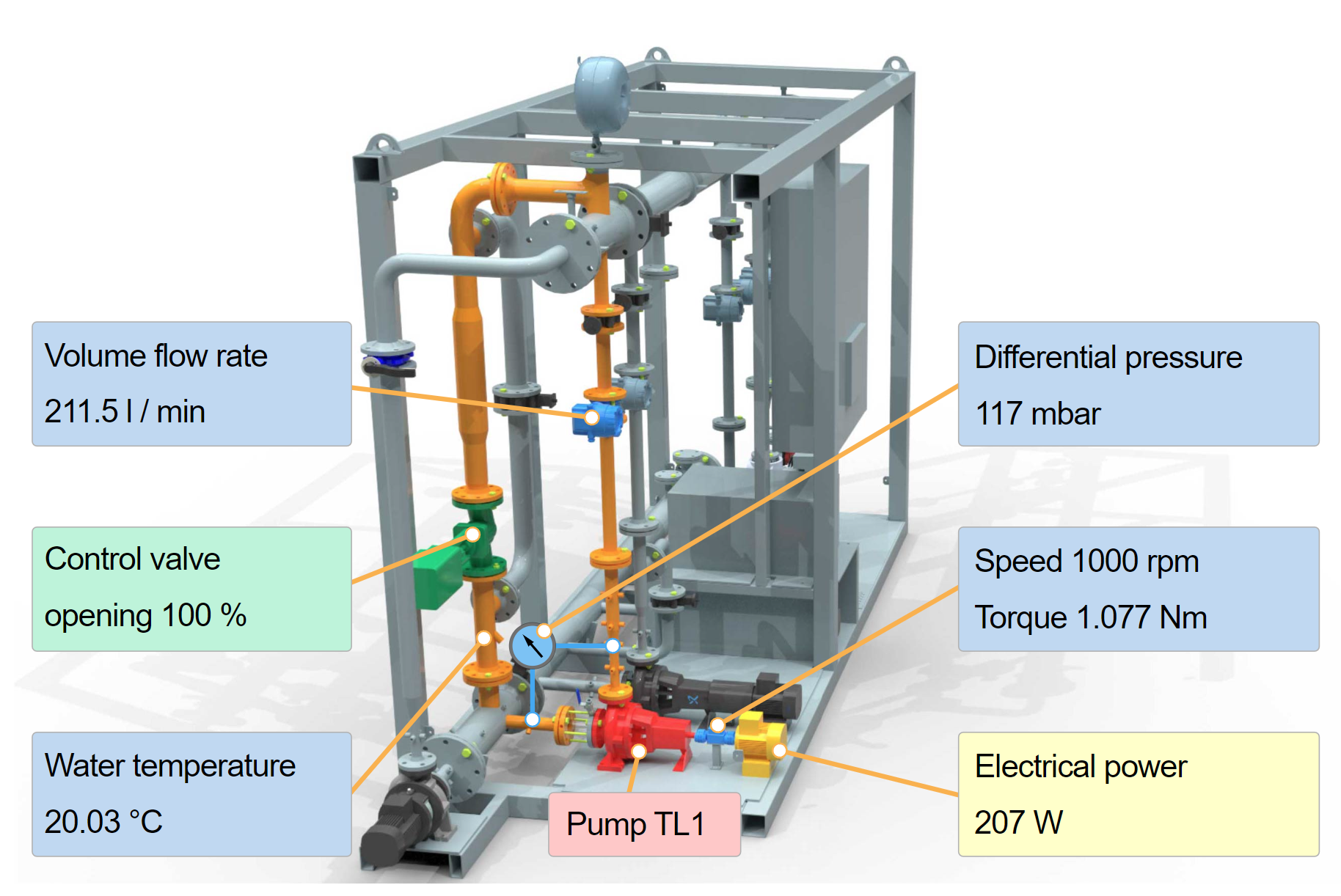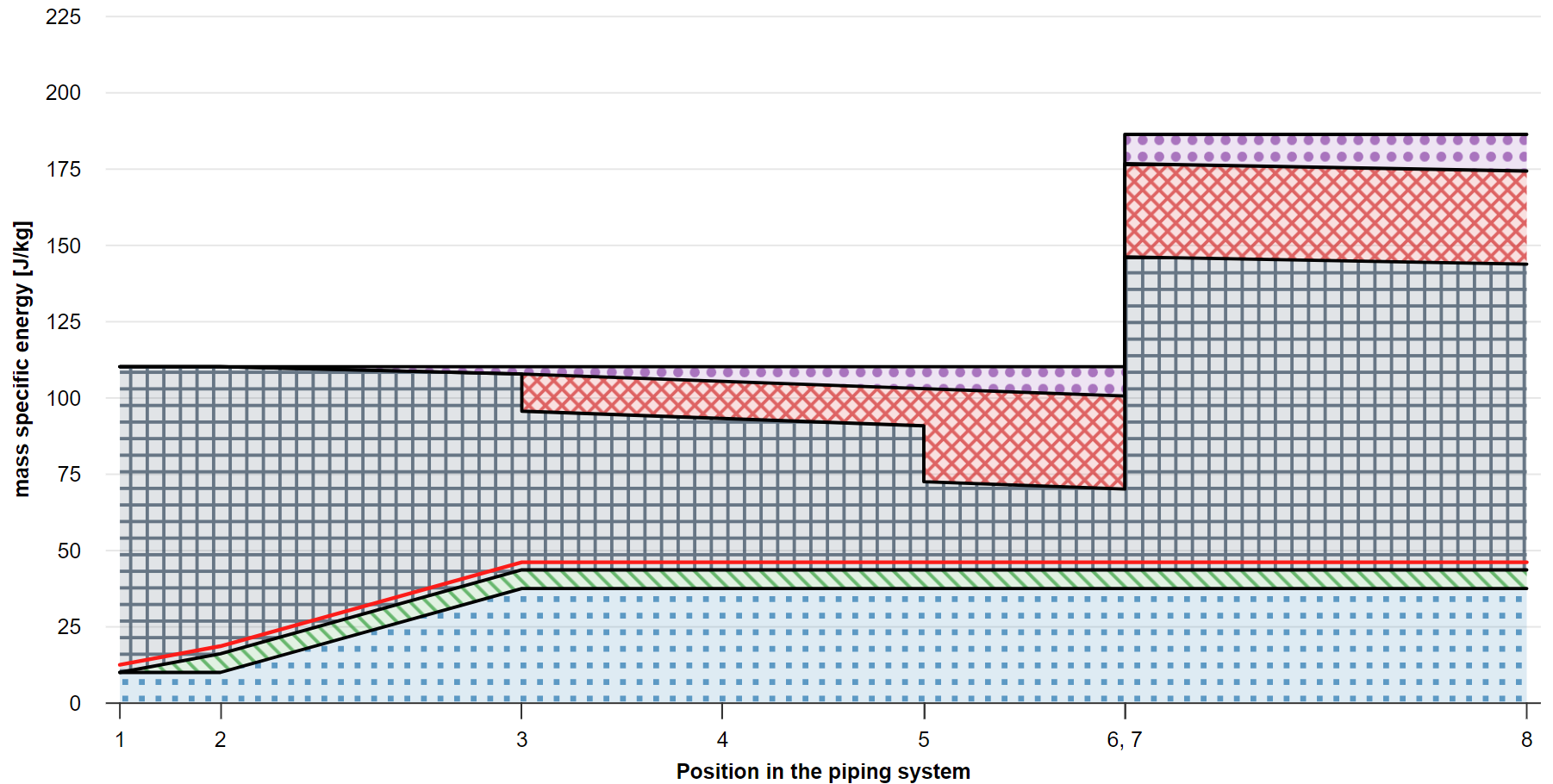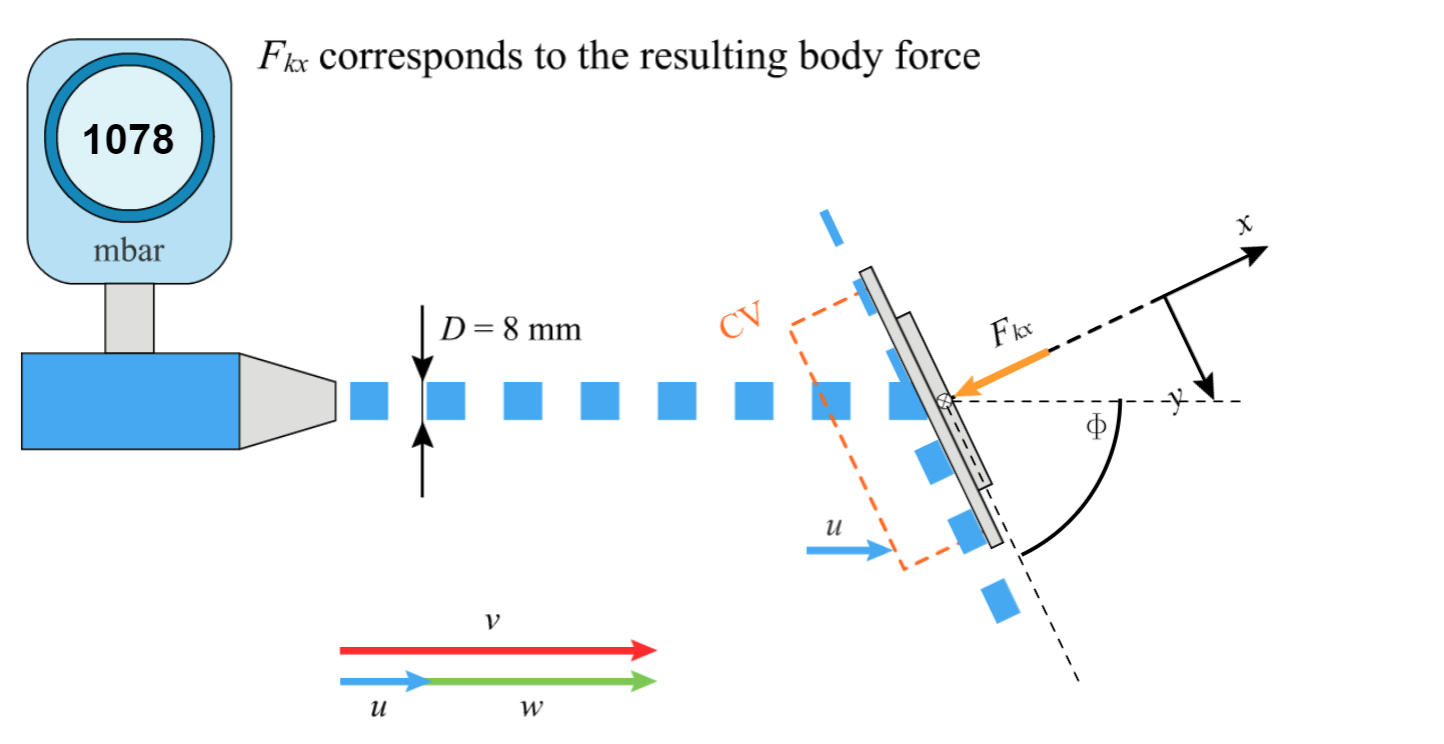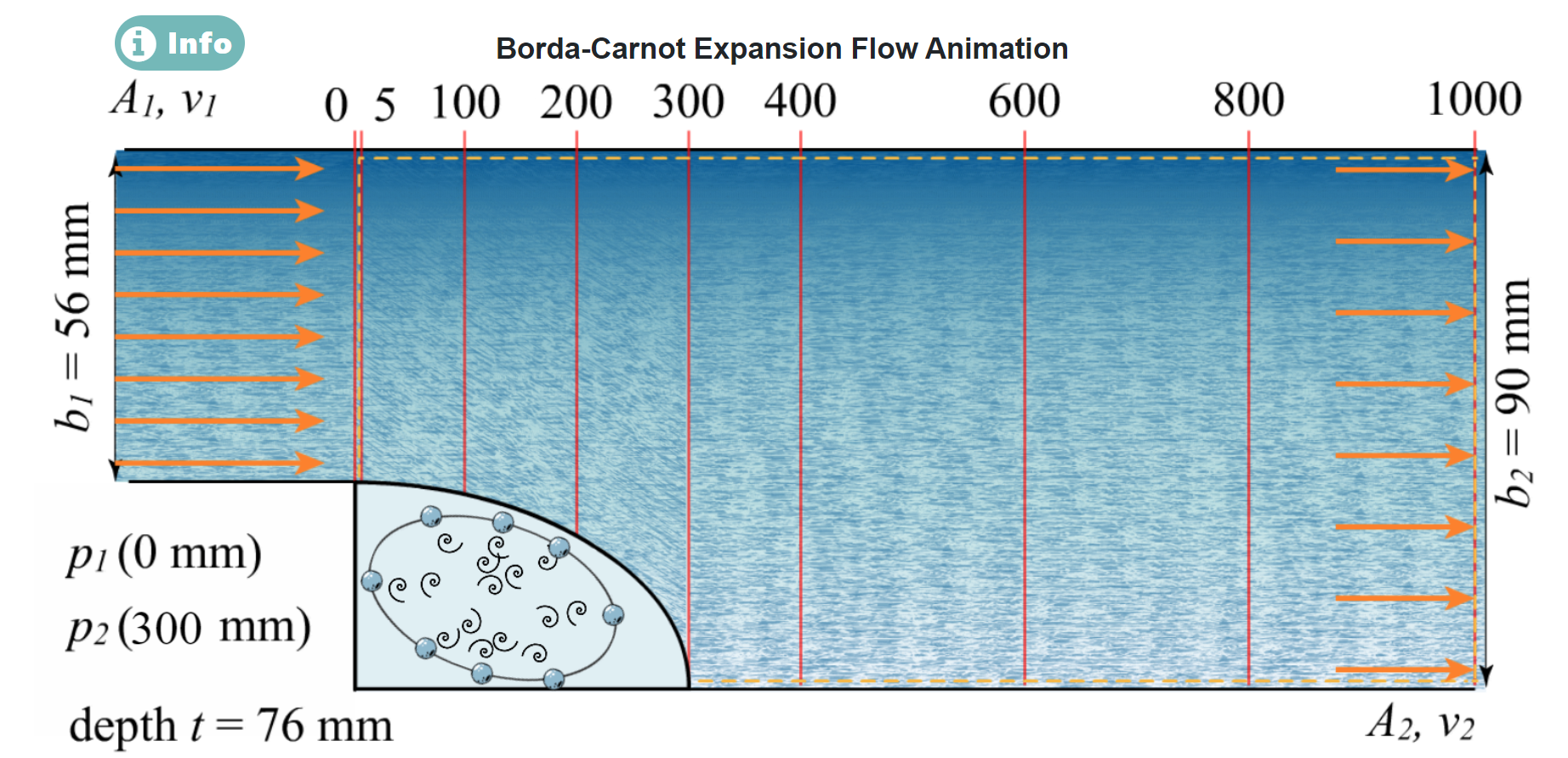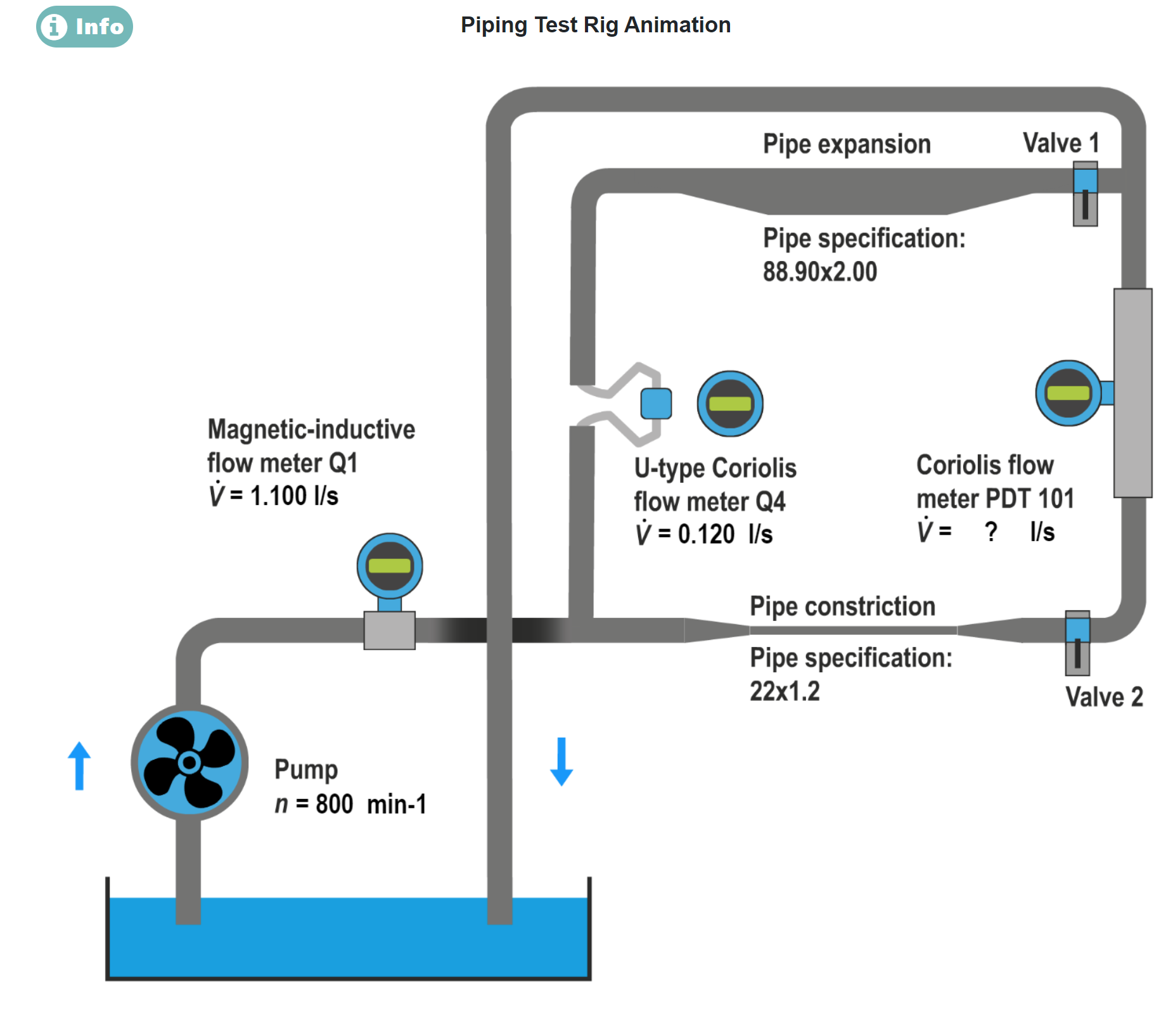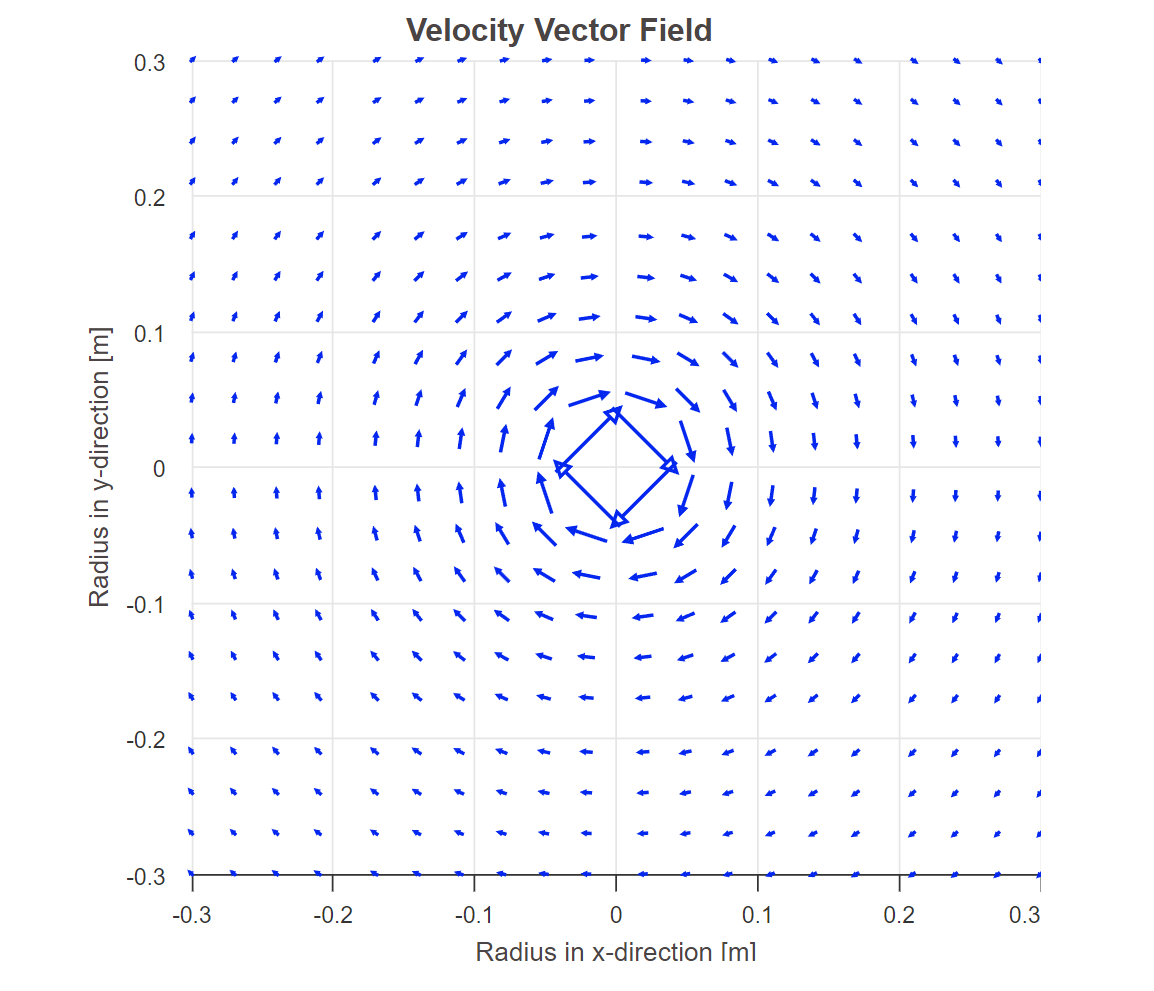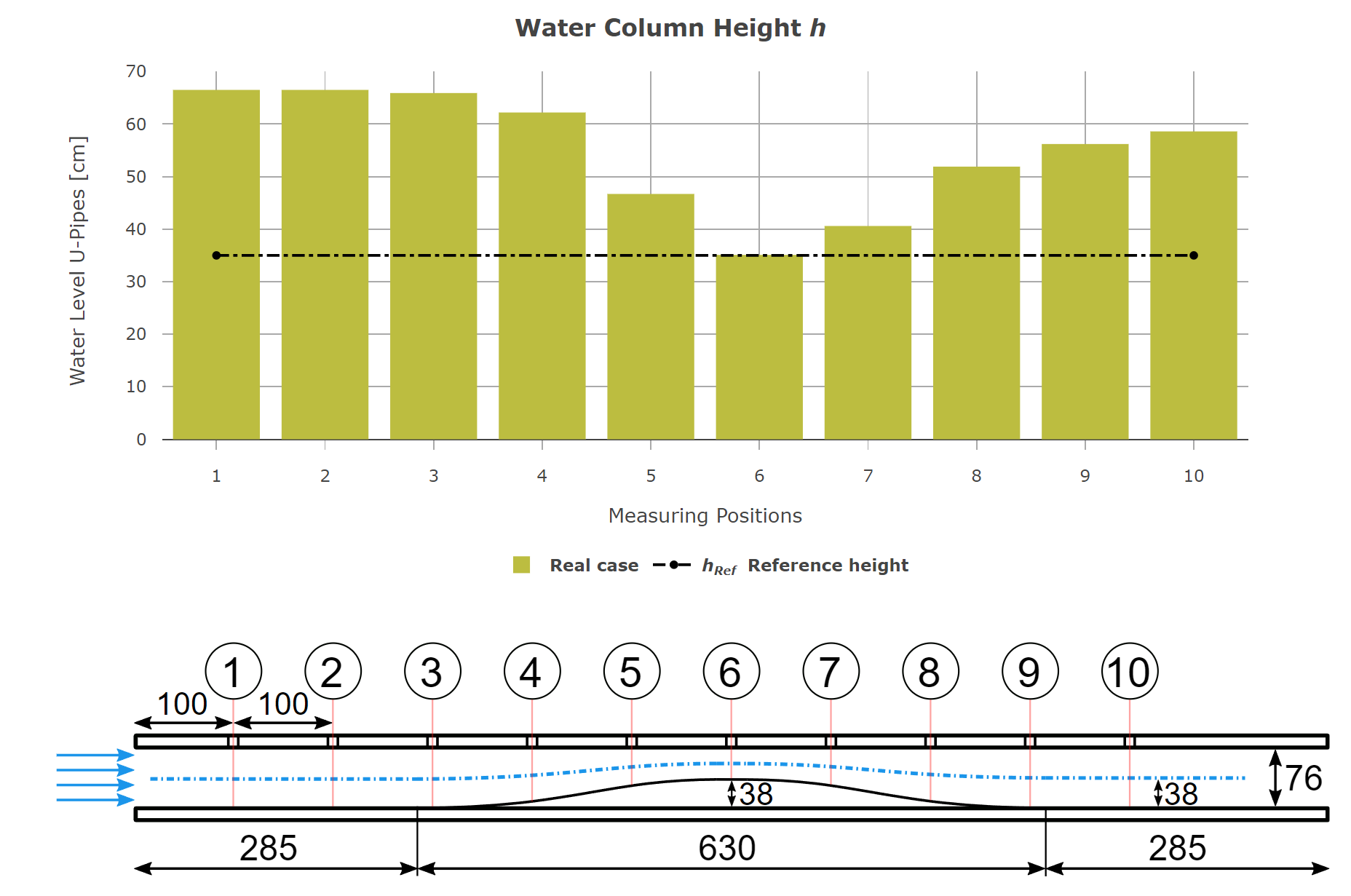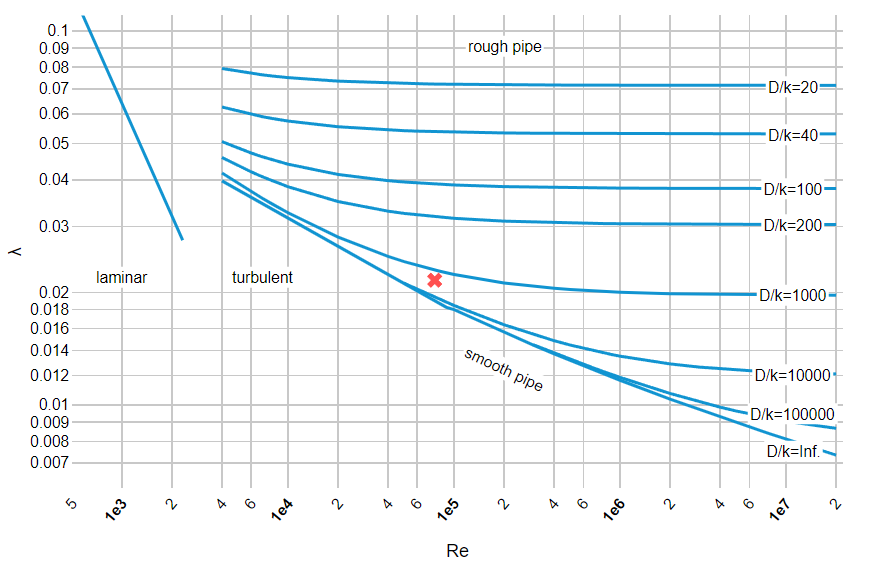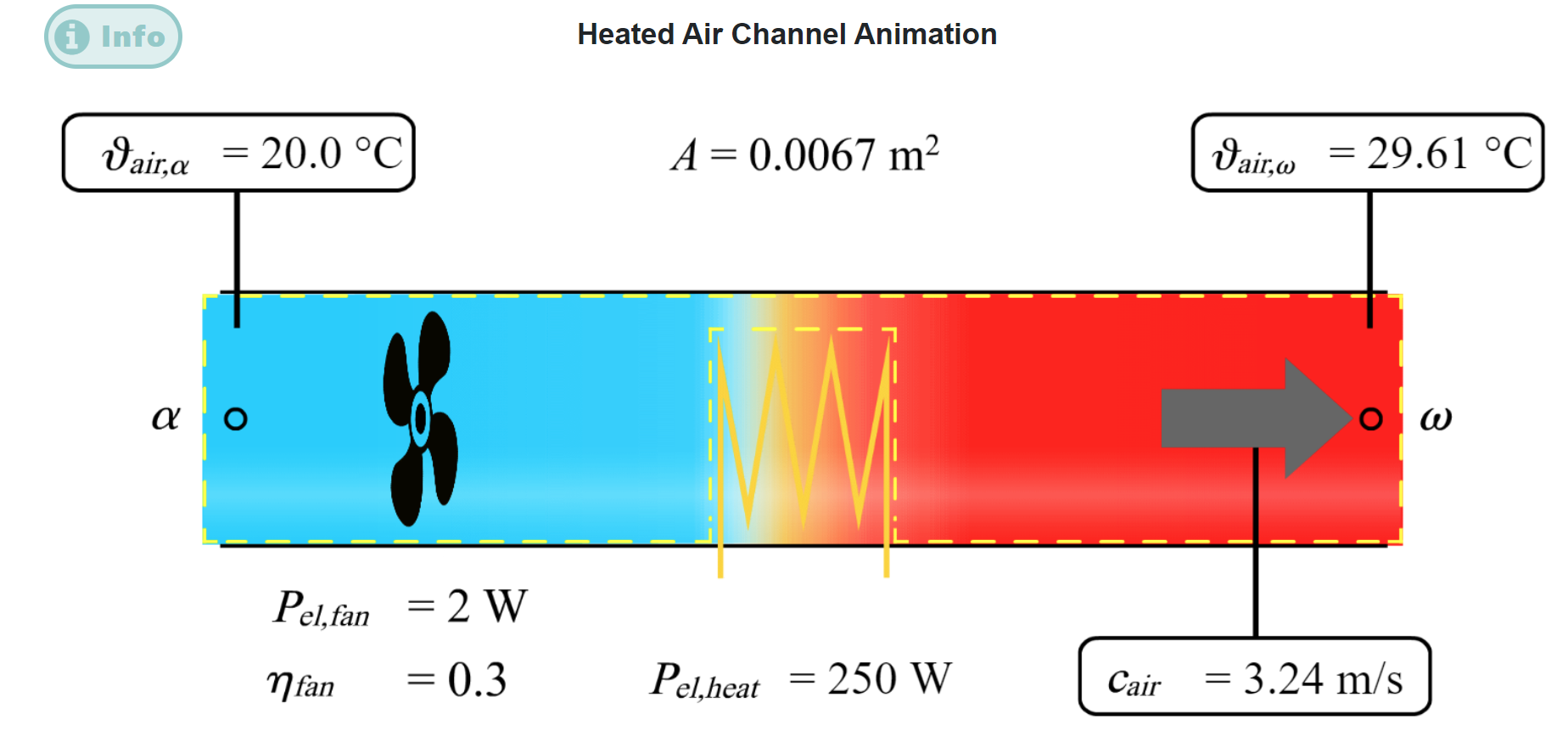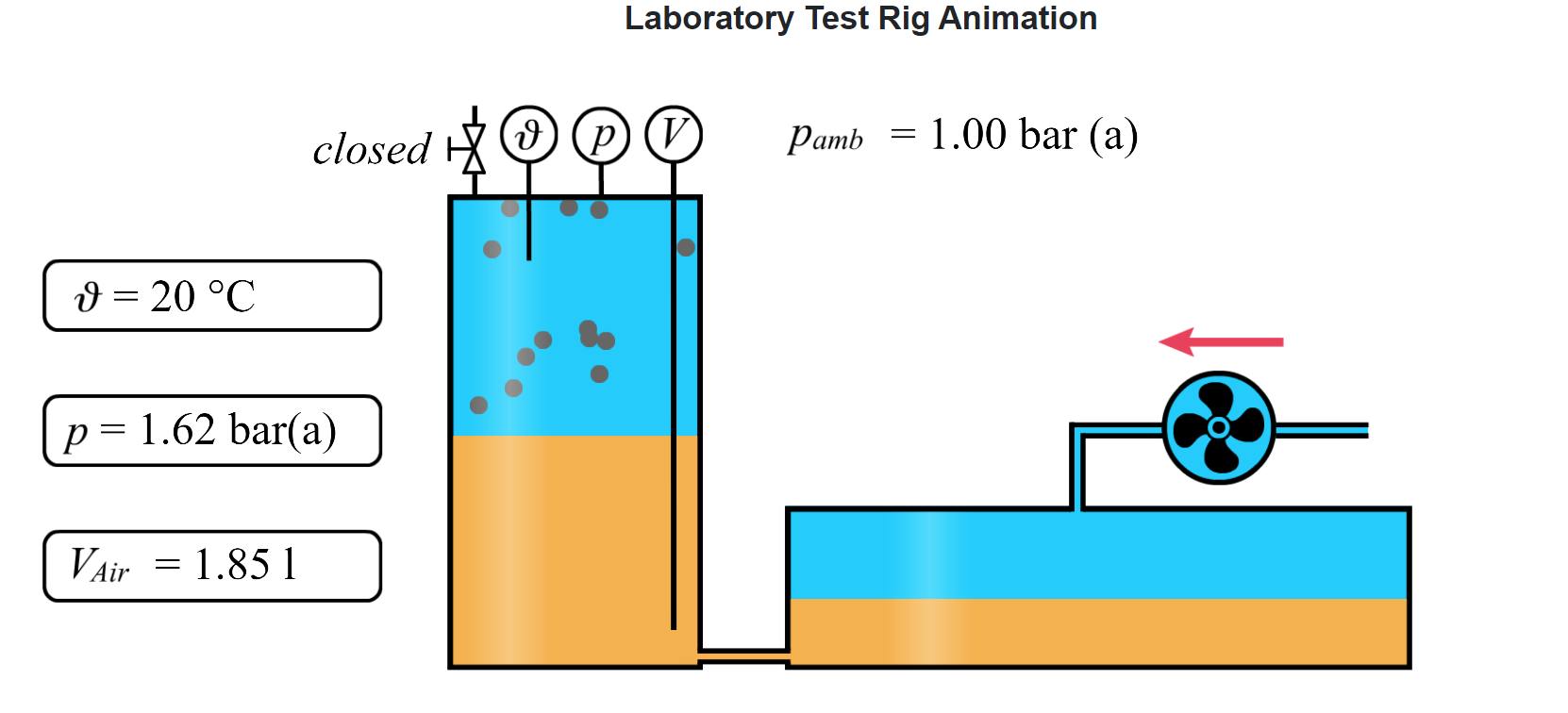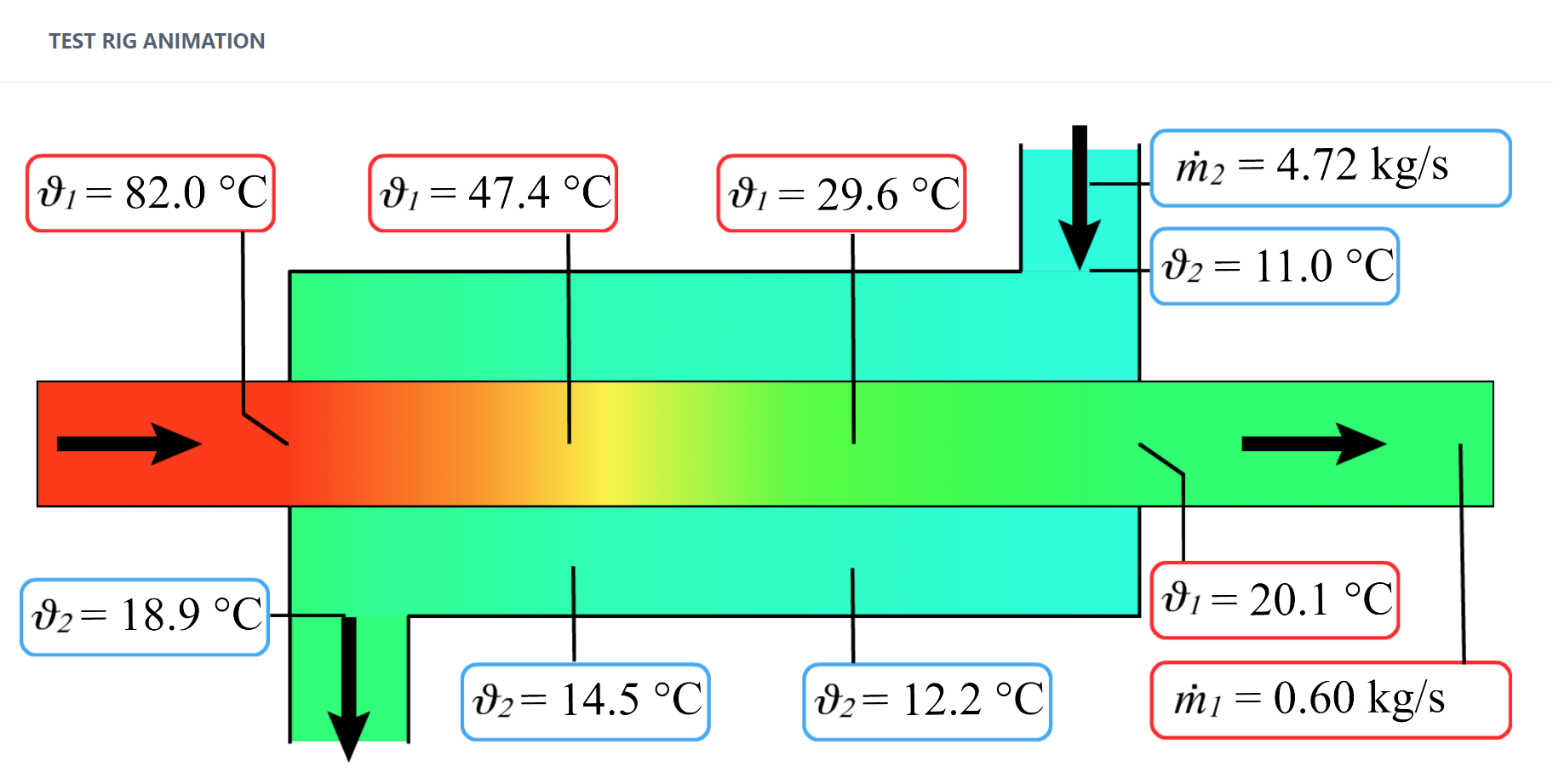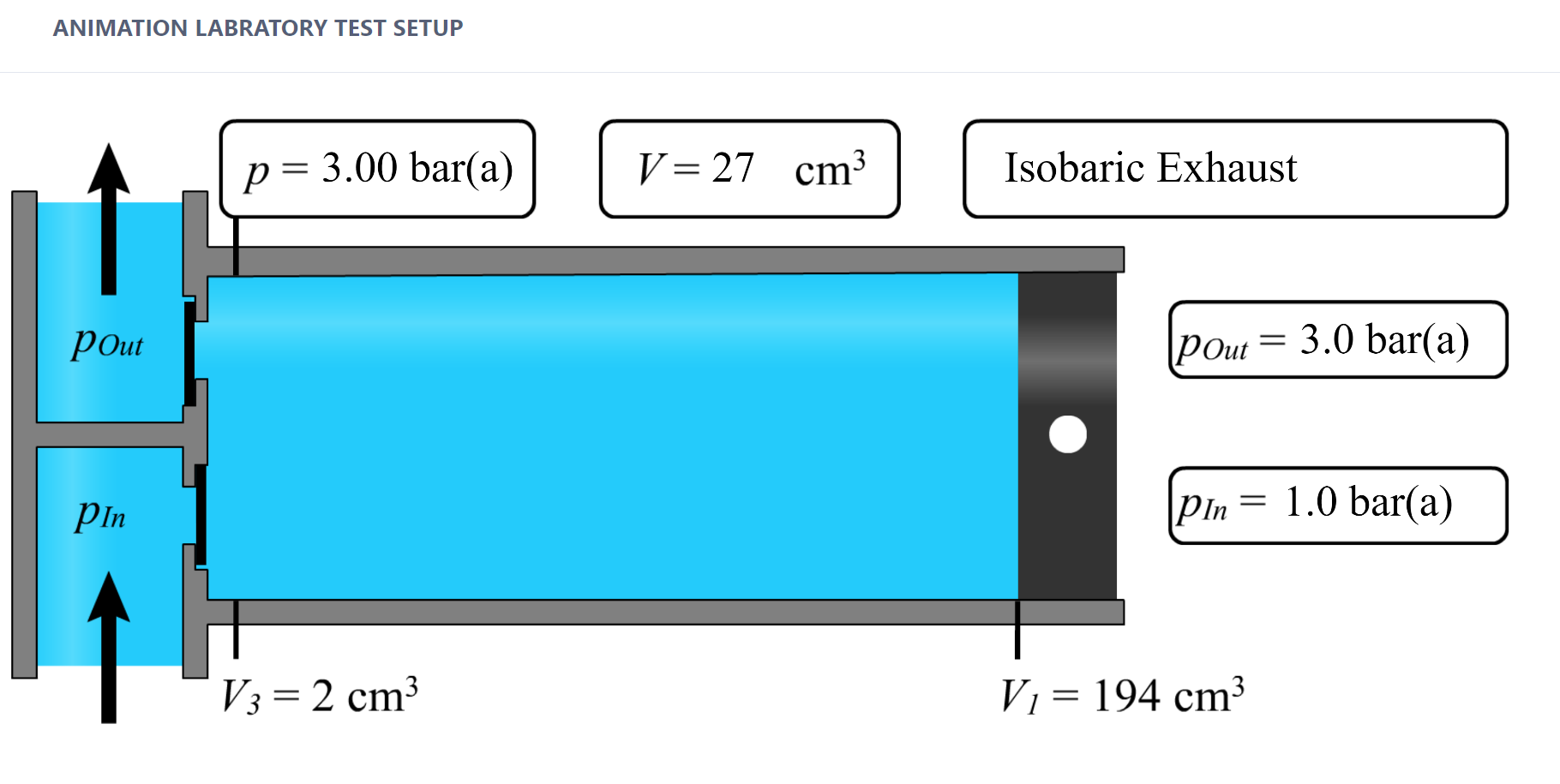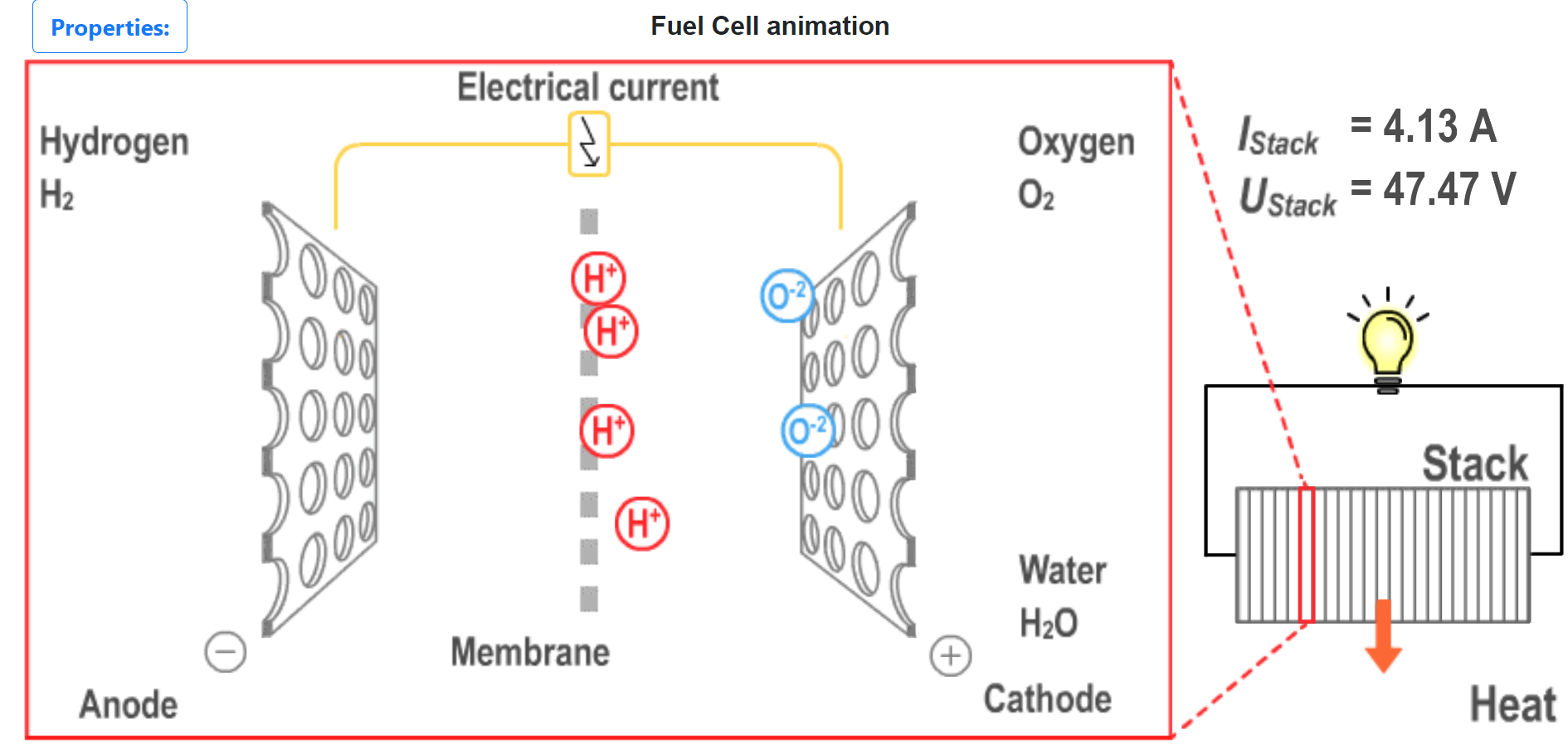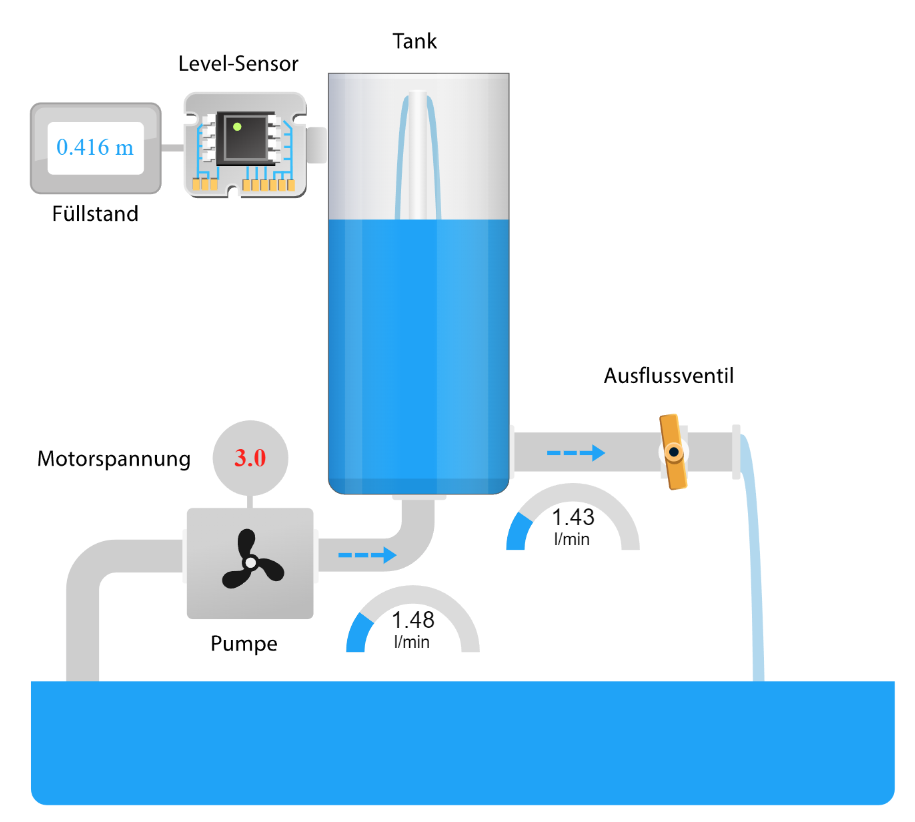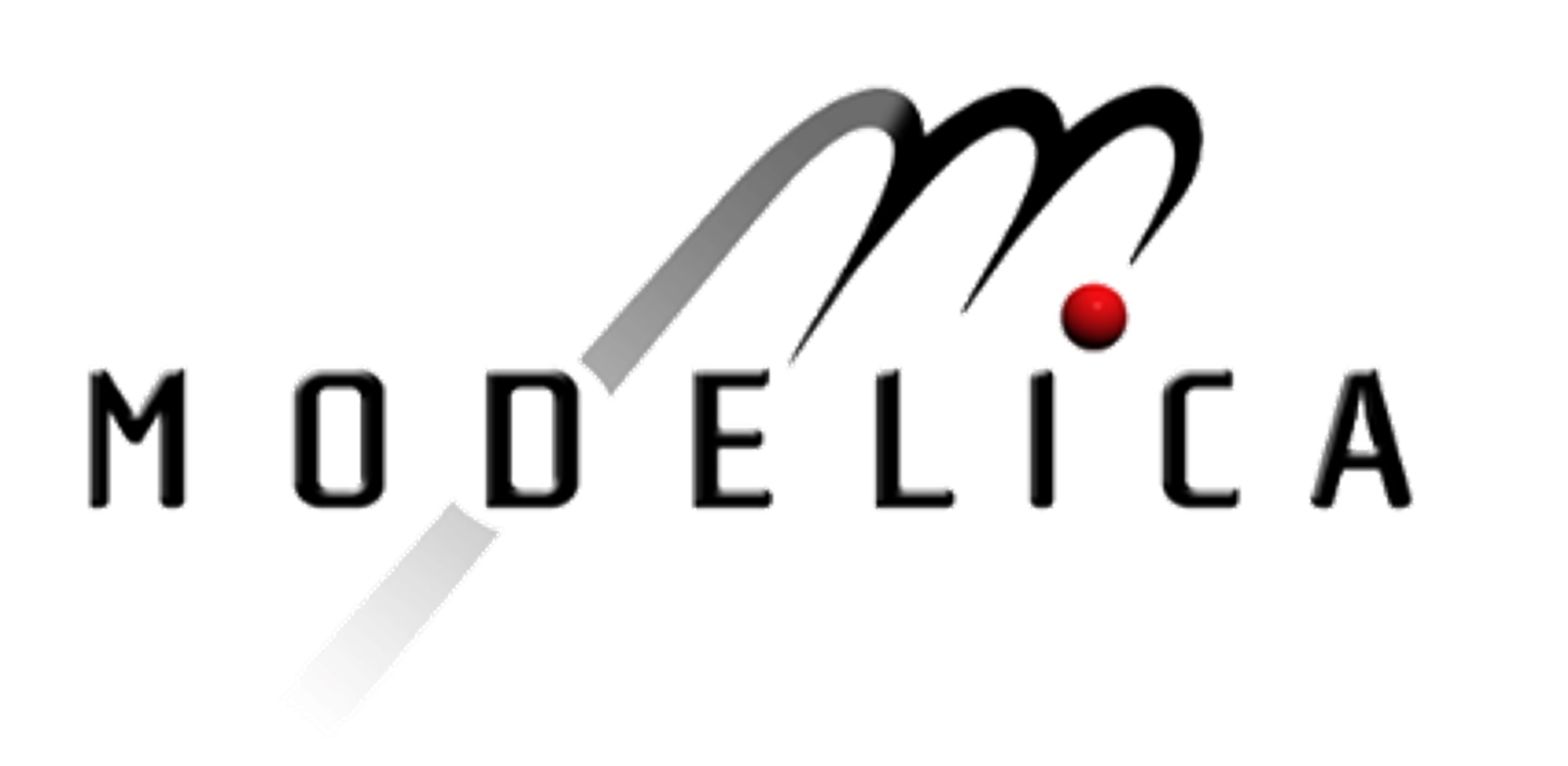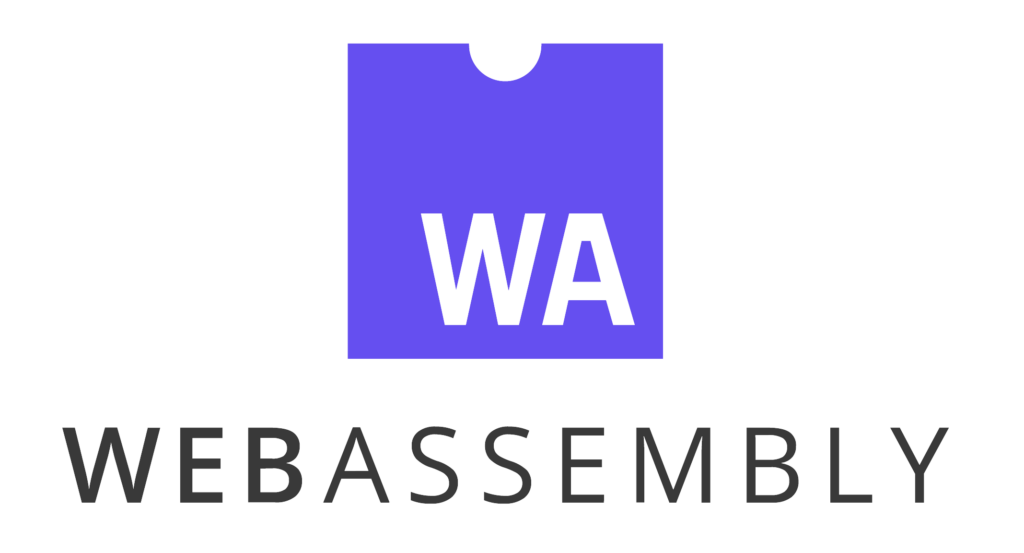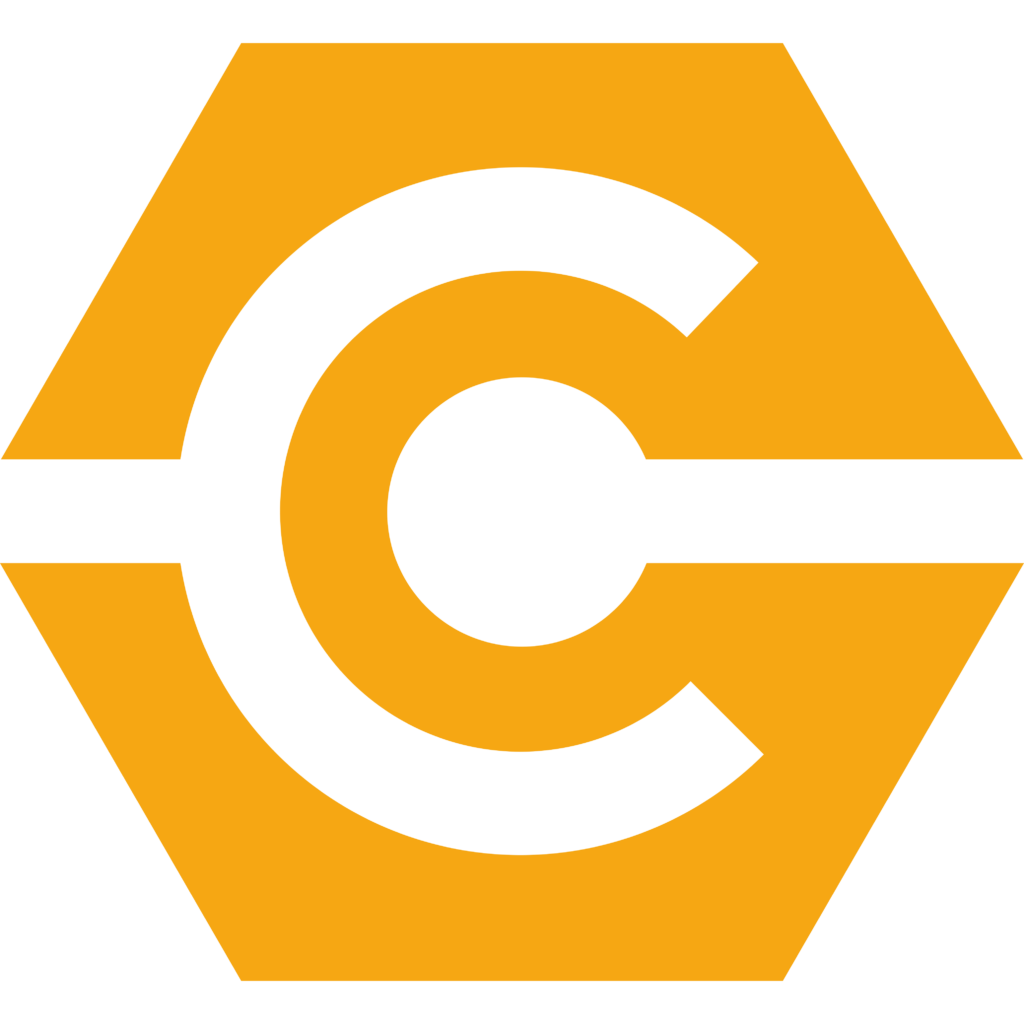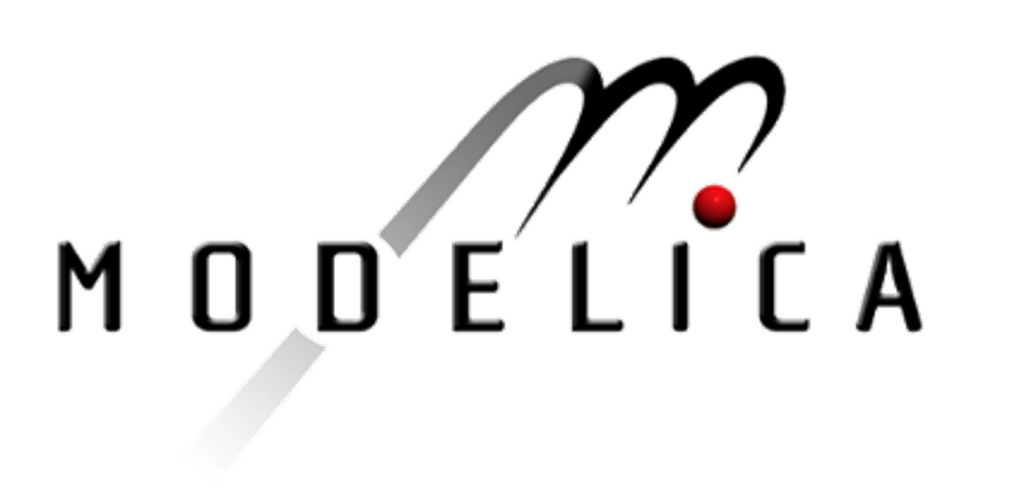Discover how science and technology come to life with DigiLabs. Our web applications enable HSLU students and industry partners to explore complex physical phenomena in an understandable and interactive way. The applications presented here are the result of various projects by the research group “System Modeling and Digital Twins”.
All models are wrong,
but some are useful.
George E. P. Box
DigiLab by
Virtual representations of laboratory test benches based on physical system models
P-8 Digital Teaching – Digital Presence – Digital Studies
The collaborative swissuniversities-project “P-8 Strengthening Digital Skills in Teaching” involves HSLU, PHLU, and PHSZ. In the subproject “DigiLab” by HSLU – Department of Engineering & Architecture three laboratory applications from various disciplines (building, electrical & mechanical engineering) were developed as digital models. These virtual labs were elaborated from a didactic perspective, integrated into the ILIAS learning platform, and used in teaching. The web applications are developed with an in-house toolchain that allows users to simulate dynamic system models based on Modelica™ directly in their browser.
GEELive
The “GEELive” at the Campus-Horw resembles a detached house in terms of its technical equipment. It is used for research and teaching and enables the investigation of all electrotechnical aspects of building technology, such as household appliances, photovoltaics or energy storage. Unlike the real GEELive, this DigiLab allows students to work independently or modify building locations. Brief simulation times make it possible to investigate various scenarios and gain experience in building optimization.
Levitator
The Institute of Electrical Engineering has several “levitator test rigs” for training purposes in linear control engineering. This test arrangement uses a transparent plastic tube and a controlled air blower to keep a table tennis ball in suspension. The students are assigned to analyze the test rig and independently develop a robust PID controller configuration. This DigiLab allows students to prepare for and follow up on laboratory lessons individually and efficiently.
Pump Test Rig
The “pump test rig” at the Campus-Horw was developed on behalf of EnergieSchweiz and is used for educational purposes. The test rig allows the investigation of various pumps in combination with different flow system. As part of basic training, the test rig can be utilized to measure pump or system characteristics, investigate various control methods or analyze pump configurations. In contrast to the real test setup, students can use this DigiLab to learn independently, regardless of time and place.
Since the pandemic, digital laboratories have become an integral part of laboratory education in the HSLUs bachelor program. The DigiLabs serve as a supplement to real test benches to facilitate independent learning. The DigiLabs of the first semester course “Energies, Fluids & Processes Laboratory – Fluiddynamics” at the Institute of Mechanical and Energy Engineering are presented below. These web applications are based on simplified physical models implemented directly in JavaScript.
Pedal Pump
Topics: Extended Bernoulli equation, energy grade line diagram and definition of energy losses
Pelton Turbine
Topics: Linear momentum equation in fluid dynamics, control volume selection, function and operation of a Pelton turbine
Borda Carnot Expansion
Topics: Borda-Carnot expansion, loss determination using the linear momentum equation, diffusers and their applications
Flow Rate Measurement
Topics: Mass conservation law, flow rate measuring devices and flow characterization
Potential Vortex
Topics: Pressure and velocity distribution in potential flows, and how modeling assumptions lead to discrepancies between mesurements and calculations
Venturi Channel
Topics: Bernoulli equation without losses, U-Tube manometers and static & dynamic pressure
Pipe Hydraulic
Topics: Definition and calculation of energy losses in pipes, comprehension of the Moody diagram, and the influence of pipe geometry, fluid properties, and flow characteristics on losses.
Since the pandemic, digital laboratories have become an integral part of laboratory education in the HSLUs bachelor program. The DigiLabs serve as a supplement to real test benches to facilitate independent learning. The DigiLabs of the second semester course “Energies, Fluids & Processes Laboratory – Thermodynamics” at the Institute of Mechanical and Energy Engineering are presented below. These web applications are based on simplified physical models implemented directly in JavaScript.
Energy Balance
Topics: 1st law of thermodynamics, identification and characterization of energy systems and system boundary selection
Ideal Gas Law
Topics: Relationship between pressure, temperature and volume for an ideal gas (ideal gas law) pressure-volume diagrams, isothermal and isochoric processes
Heat Exchanger
Topics: Conservation equations, design calculations, operation and flow-related influences of heat exchangers
Piston Compressor
Topics: 1st law of thermodynamics for closed systems, isothermal, isentropic, isobaric and isochoric processes
Hydrogen Fuel Cell
Topics: Functional principle, operating characteristics, efficiency and energy balance of fuel cell systems
Radial Compressor
Topics: 1st law of thermodynamics for open systems, design, function, and operating characteristics of a radial compressor, isentropic and polytropic processes
InnoLehre7
Our first DigiLab web app was realized as part of an internal teaching development project. We used the Bodylight.js tool to run our Modelica system model directly in a web browser. Bodylight.js is a toolchain developed by the Charles University spin-off company Creative Connections.
We thank the Creative Connections team for their cooperation and support.
Tank Control System
This DigiLab was used in the course “Control Systems.” Using the digital test bench, students were asked to design a PID controller for a tank system. The guided learning sequence was implemented on the ILIAS learning platform.
MostBet’in rəsmi veb saytı – https://mostbetáz.com/ ilə dünyanın ən möhtəşəm bahis təcrübəsini yaşayın! Bizim platformamızda ən geniş idman seçimləri, uğurlu casino oyunları və canlı yayımlanan real vaxtın təşvişi sizi gözləyir. Keyfiyyət və rahatlıq üçün hər şey bir arada –
Mostbet AZ-də ən yaxşı oyunları və bahis imkanlarını qeyd edin!
MostBet’in rəsmi veb saytı – https://mostbetáz.com/ ilə dünyanın ən möhtəşəm bahis təcrübəsini yaşayın! Bizim platformamızda ən geniş idman seçimləri, uğurlu casino oyunları və canlı yayımlanan real vaxtın təşvişi sizi gözləyir. Keyfiyyət və rahatlıq üçün hər şey bir arada –
Mostbet AZ-də ən yaxşı oyunları və bahis imkanlarını qeyd edin!
MostBet’in rəsmi veb saytı – https://mostbetáz.com/ ilə dünyanın ən möhtəşəm bahis təcrübəsini yaşayın! Bizim platformamızda ən geniş idman seçimləri, uğurlu casino oyunları və canlı yayımlanan real vaxtın təşvişi sizi gözləyir. Keyfiyyət və rahatlıq üçün hər şey bir arada –
Mostbet AZ-də ən yaxşı oyunları və bahis imkanlarını qeyd edin!
MostBet’in rəsmi veb saytı – https://mostbetáz.com/ ilə dünyanın ən möhtəşəm bahis təcrübəsini yaşayın! Bizim platformamızda ən geniş idman seçimləri, uğurlu casino oyunları və canlı yayımlanan real vaxtın təşvişi sizi gözləyir. Keyfiyyət və rahatlıq üçün hər şey bir arada –
Mostbet AZ-də ən yaxşı oyunları və bahis imkanlarını qeyd edin!
MostBet’in rəsmi veb saytı – https://mostbetáz.com/ ilə dünyanın ən möhtəşəm bahis təcrübəsini yaşayın! Bizim platformamızda ən geniş idman seçimləri, uğurlu casino oyunları və canlı yayımlanan real vaxtın təşvişi sizi gözləyir. Keyfiyyət və rahatlıq üçün hər şey bir arada –
Mostbet AZ-də ən yaxşı oyunları və bahis imkanlarını qeyd edin!
MostBet’in rəsmi veb saytı – https://mostbetáz.com/ ilə dünyanın ən möhtəşəm bahis təcrübəsini yaşayın! Bizim platformamızda ən geniş idman seçimləri, uğurlu casino oyunları və canlı yayımlanan real vaxtın təşvişi sizi gözləyir. Keyfiyyət və rahatlıq üçün hər şey bir arada –
Mostbet AZ-də ən yaxşı oyunları və bahis imkanlarını qeyd edin!
MostBet’in rəsmi veb saytı – https://mostbetáz.com/ ilə dünyanın ən möhtəşəm bahis təcrübəsini yaşayın! Bizim platformamızda ən geniş idman seçimləri, uğurlu casino oyunları və canlı yayımlanan real vaxtın təşvişi sizi gözləyir. Keyfiyyət və rahatlıq üçün hər şey bir arada –
Mostbet AZ-də ən yaxşı oyunları və bahis imkanlarını qeyd edin!
MostBet’in rəsmi veb saytı – https://mostbetáz.com/ ilə dünyanın ən möhtəşəm bahis təcrübəsini yaşayın! Bizim platformamızda ən geniş idman seçimləri, uğurlu casino oyunları və canlı yayımlanan real vaxtın təşvişi sizi gözləyir. Keyfiyyət və rahatlıq üçün hər şey bir arada –
Mostbet AZ-də ən yaxşı oyunları və bahis imkanlarını qeyd edin!
MostBet’in rəsmi veb saytı – https://mostbetáz.com/ ilə dünyanın ən möhtəşəm bahis təcrübəsini yaşayın! Bizim platformamızda ən geniş idman seçimləri, uğurlu casino oyunları və canlı yayımlanan real vaxtın təşvişi sizi gözləyir. Keyfiyyət və rahatlıq üçün hər şey bir arada –
Mostbet AZ-də ən yaxşı oyunları və bahis imkanlarını qeyd edin!
MostBet’in rəsmi veb saytı – https://mostbetáz.com/ ilə dünyanın ən möhtəşəm bahis təcrübəsini yaşayın! Bizim platformamızda ən geniş idman seçimləri, uğurlu casino oyunları və canlı yayımlanan real vaxtın təşvişi sizi gözləyir. Keyfiyyət və rahatlıq üçün hər şey bir arada –
Mostbet AZ-də ən yaxşı oyunları və bahis imkanlarını qeyd edin!
MostBet’in rəsmi veb saytı – https://mostbetáz.com/ ilə dünyanın ən möhtəşəm bahis təcrübəsini yaşayın! Bizim platformamızda ən geniş idman seçimləri, uğurlu casino oyunları və canlı yayımlanan real vaxtın təşvişi sizi gözləyir. Keyfiyyət və rahatlıq üçün hər şey bir arada –
Mostbet AZ-də ən yaxşı oyunları və bahis imkanlarını qeyd edin!
MostBet’in rəsmi veb saytı – https://mostbetáz.com/ ilə dünyanın ən möhtəşəm bahis təcrübəsini yaşayın! Bizim platformamızda ən geniş idman seçimləri, uğurlu casino oyunları və canlı yayımlanan real vaxtın təşvişi sizi gözləyir. Keyfiyyət və rahatlıq üçün hər şey bir arada –
Mostbet AZ-də ən yaxşı oyunları və bahis imkanlarını qeyd edin!
MostBet’in rəsmi veb saytı – https://mostbetáz.com/ ilə dünyanın ən möhtəşəm bahis təcrübəsini yaşayın! Bizim platformamızda ən geniş idman seçimləri, uğurlu casino oyunları və canlı yayımlanan real vaxtın təşvişi sizi gözləyir. Keyfiyyət və rahatlıq üçün hər şey bir arada –
Mostbet AZ-də ən yaxşı oyunları və bahis imkanlarını qeyd edin!
MostBet’in rəsmi veb saytı – https://mostbetáz.com/ ilə dünyanın ən möhtəşəm bahis təcrübəsini yaşayın! Bizim platformamızda ən geniş idman seçimləri, uğurlu casino oyunları və canlı yayımlanan real vaxtın təşvişi sizi gözləyir. Keyfiyyət və rahatlıq üçün hər şey bir arada –
Mostbet AZ-də ən yaxşı oyunları və bahis imkanlarını qeyd edin!
MostBet’in rəsmi veb saytı – https://mostbetáz.com/ ilə dünyanın ən möhtəşəm bahis təcrübəsini yaşayın! Bizim platformamızda ən geniş idman seçimləri, uğurlu casino oyunları və canlı yayımlanan real vaxtın təşvişi sizi gözləyir. Keyfiyyət və rahatlıq üçün hər şey bir arada –
Mostbet AZ-də ən yaxşı oyunları və bahis imkanlarını qeyd edin!
MostBet’in rəsmi veb saytı – https://mostbetáz.com/ ilə dünyanın ən möhtəşəm bahis təcrübəsini yaşayın! Bizim platformamızda ən geniş idman seçimləri, uğurlu casino oyunları və canlı yayımlanan real vaxtın təşvişi sizi gözləyir. Keyfiyyət və rahatlıq üçün hər şey bir arada –
Mostbet AZ-də ən yaxşı oyunları və bahis imkanlarını qeyd edin!
MostBet’in rəsmi veb saytı – https://mostbetáz.com/ ilə dünyanın ən möhtəşəm bahis təcrübəsini yaşayın! Bizim platformamızda ən geniş idman seçimləri, uğurlu casino oyunları və canlı yayımlanan real vaxtın təşvişi sizi gözləyir. Keyfiyyət və rahatlıq üçün hər şey bir arada –
Mostbet AZ-də ən yaxşı oyunları və bahis imkanlarını qeyd edin!
MostBet’in rəsmi veb saytı – https://mostbetáz.com/ ilə dünyanın ən möhtəşəm bahis təcrübəsini yaşayın! Bizim platformamızda ən geniş idman seçimləri, uğurlu casino oyunları və canlı yayımlanan real vaxtın təşvişi sizi gözləyir. Keyfiyyət və rahatlıq üçün hər şey bir arada –
Mostbet AZ-də ən yaxşı oyunları və bahis imkanlarını qeyd edin!
MostBet’in rəsmi veb saytı – https://mostbetáz.com/ ilə dünyanın ən möhtəşəm bahis təcrübəsini yaşayın! Bizim platformamızda ən geniş idman seçimləri, uğurlu casino oyunları və canlı yayımlanan real vaxtın təşvişi sizi gözləyir. Keyfiyyət və rahatlıq üçün hər şey bir arada –
Mostbet AZ-də ən yaxşı oyunları və bahis imkanlarını qeyd edin!
MostBet’in rəsmi veb saytı – https://mostbetáz.com/ ilə dünyanın ən möhtəşəm bahis təcrübəsini yaşayın! Bizim platformamızda ən geniş idman seçimləri, uğurlu casino oyunları və canlı yayımlanan real vaxtın təşvişi sizi gözləyir. Keyfiyyət və rahatlıq üçün hər şey bir arada –
Mostbet AZ-də ən yaxşı oyunları və bahis imkanlarını qeyd edin!
MostBet’in rəsmi veb saytı – https://mostbetáz.com/ ilə dünyanın ən möhtəşəm bahis təcrübəsini yaşayın! Bizim platformamızda ən geniş idman seçimləri, uğurlu casino oyunları və canlı yayımlanan real vaxtın təşvişi sizi gözləyir. Keyfiyyət və rahatlıq üçün hər şey bir arada –
Mostbet AZ-də ən yaxşı oyunları və bahis imkanlarını qeyd edin!
MostBet’in rəsmi veb saytı – https://mostbetáz.com/ ilə dünyanın ən möhtəşəm bahis təcrübəsini yaşayın! Bizim platformamızda ən geniş idman seçimləri, uğurlu casino oyunları və canlı yayımlanan real vaxtın təşvişi sizi gözləyir. Keyfiyyət və rahatlıq üçün hər şey bir arada –
Mostbet AZ-də ən yaxşı oyunları və bahis imkanlarını qeyd edin!
MostBet’in rəsmi veb saytı – https://mostbetáz.com/ ilə dünyanın ən möhtəşəm bahis təcrübəsini yaşayın! Bizim platformamızda ən geniş idman seçimləri, uğurlu casino oyunları və canlı yayımlanan real vaxtın təşvişi sizi gözləyir. Keyfiyyət və rahatlıq üçün hər şey bir arada –
Mostbet AZ-də ən yaxşı oyunları və bahis imkanlarını qeyd edin!
MostBet’in rəsmi veb saytı – https://mostbetáz.com/ ilə dünyanın ən möhtəşəm bahis təcrübəsini yaşayın! Bizim platformamızda ən geniş idman seçimləri, uğurlu casino oyunları və canlı yayımlanan real vaxtın təşvişi sizi gözləyir. Keyfiyyət və rahatlıq üçün hər şey bir arada –
Mostbet AZ-də ən yaxşı oyunları və bahis imkanlarını qeyd edin!
MostBet’in rəsmi veb saytı – https://mostbetáz.com/ ilə dünyanın ən möhtəşəm bahis təcrübəsini yaşayın! Bizim platformamızda ən geniş idman seçimləri, uğurlu casino oyunları və canlı yayımlanan real vaxtın təşvişi sizi gözləyir. Keyfiyyət və rahatlıq üçün hər şey bir arada –
Mostbet AZ-də ən yaxşı oyunları və bahis imkanlarını qeyd edin!
MostBet’in rəsmi veb saytı – https://mostbetáz.com/ ilə dünyanın ən möhtəşəm bahis təcrübəsini yaşayın! Bizim platformamızda ən geniş idman seçimləri, uğurlu casino oyunları və canlı yayımlanan real vaxtın təşvişi sizi gözləyir. Keyfiyyət və rahatlıq üçün hər şey bir arada –
Mostbet AZ-də ən yaxşı oyunları və bahis imkanlarını qeyd edin!
MostBet’in rəsmi veb saytı – https://mostbetáz.com/ ilə dünyanın ən möhtəşəm bahis təcrübəsini yaşayın! Bizim platformamızda ən geniş idman seçimləri, uğurlu casino oyunları və canlı yayımlanan real vaxtın təşvişi sizi gözləyir. Keyfiyyət və rahatlıq üçün hər şey bir arada –
Mostbet AZ-də ən yaxşı oyunları və bahis imkanlarını qeyd edin!
MostBet’in rəsmi veb saytı – https://mostbetáz.com/ ilə dünyanın ən möhtəşəm bahis təcrübəsini yaşayın! Bizim platformamızda ən geniş idman seçimləri, uğurlu casino oyunları və canlı yayımlanan real vaxtın təşvişi sizi gözləyir. Keyfiyyət və rahatlıq üçün hər şey bir arada –
Mostbet AZ-də ən yaxşı oyunları və bahis imkanlarını qeyd edin!
MostBet’in rəsmi veb saytı – https://mostbetáz.com/ ilə dünyanın ən möhtəşəm bahis təcrübəsini yaşayın! Bizim platformamızda ən geniş idman seçimləri, uğurlu casino oyunları və canlı yayımlanan real vaxtın təşvişi sizi gözləyir. Keyfiyyət və rahatlıq üçün hər şey bir arada –
Mostbet AZ-də ən yaxşı oyunları və bahis imkanlarını qeyd edin!
MostBet’in rəsmi veb saytı – https://mostbetáz.com/ ilə dünyanın ən möhtəşəm bahis təcrübəsini yaşayın! Bizim platformamızda ən geniş idman seçimləri, uğurlu casino oyunları və canlı yayımlanan real vaxtın təşvişi sizi gözləyir. Keyfiyyət və rahatlıq üçün hər şey bir arada –
Mostbet AZ-də ən yaxşı oyunları və bahis imkanlarını qeyd edin!
MostBet’in rəsmi veb saytı – https://mostbetáz.com/ ilə dünyanın ən möhtəşəm bahis təcrübəsini yaşayın! Bizim platformamızda ən geniş idman seçimləri, uğurlu casino oyunları və canlı yayımlanan real vaxtın təşvişi sizi gözləyir. Keyfiyyət və rahatlıq üçün hər şey bir arada –
Mostbet AZ-də ən yaxşı oyunları və bahis imkanlarını qeyd edin!
MostBet’in rəsmi veb saytı – https://mostbetáz.com/ ilə dünyanın ən möhtəşəm bahis təcrübəsini yaşayın! Bizim platformamızda ən geniş idman seçimləri, uğurlu casino oyunları və canlı yayımlanan real vaxtın təşvişi sizi gözləyir. Keyfiyyət və rahatlıq üçün hər şey bir arada –
Mostbet AZ-də ən yaxşı oyunları və bahis imkanlarını qeyd edin!
MostBet’in rəsmi veb saytı – https://mostbetáz.com/ ilə dünyanın ən möhtəşəm bahis təcrübəsini yaşayın! Bizim platformamızda ən geniş idman seçimləri, uğurlu casino oyunları və canlı yayımlanan real vaxtın təşvişi sizi gözləyir. Keyfiyyət və rahatlıq üçün hər şey bir arada –
Mostbet AZ-də ən yaxşı oyunları və bahis imkanlarını qeyd edin!
MostBet’in rəsmi veb saytı – https://mostbetáz.com/ ilə dünyanın ən möhtəşəm bahis təcrübəsini yaşayın! Bizim platformamızda ən geniş idman seçimləri, uğurlu casino oyunları və canlı yayımlanan real vaxtın təşvişi sizi gözləyir. Keyfiyyət və rahatlıq üçün hər şey bir arada –
Mostbet AZ-də ən yaxşı oyunları və bahis imkanlarını qeyd edin!
MostBet’in rəsmi veb saytı – https://mostbetáz.com/ ilə dünyanın ən möhtəşəm bahis təcrübəsini yaşayın! Bizim platformamızda ən geniş idman seçimləri, uğurlu casino oyunları və canlı yayımlanan real vaxtın təşvişi sizi gözləyir. Keyfiyyət və rahatlıq üçün hər şey bir arada –
Mostbet AZ-də ən yaxşı oyunları və bahis imkanlarını qeyd edin!
MostBet’in rəsmi veb saytı – https://mostbetáz.com/ ilə dünyanın ən möhtəşəm bahis təcrübəsini yaşayın! Bizim platformamızda ən geniş idman seçimləri, uğurlu casino oyunları və canlı yayımlanan real vaxtın təşvişi sizi gözləyir. Keyfiyyət və rahatlıq üçün hər şey bir arada –
Mostbet AZ-də ən yaxşı oyunları və bahis imkanlarını qeyd edin!
MostBet’in rəsmi veb saytı – https://mostbetáz.com/ ilə dünyanın ən möhtəşəm bahis təcrübəsini yaşayın! Bizim platformamızda ən geniş idman seçimləri, uğurlu casino oyunları və canlı yayımlanan real vaxtın təşvişi sizi gözləyir. Keyfiyyət və rahatlıq üçün hər şey bir arada –
Mostbet AZ-də ən yaxşı oyunları və bahis imkanlarını qeyd edin!
MostBet’in rəsmi veb saytı – https://mostbetáz.com/ ilə dünyanın ən möhtəşəm bahis təcrübəsini yaşayın! Bizim platformamızda ən geniş idman seçimləri, uğurlu casino oyunları və canlı yayımlanan real vaxtın təşvişi sizi gözləyir. Keyfiyyət və rahatlıq üçün hər şey bir arada –
Mostbet AZ-də ən yaxşı oyunları və bahis imkanlarını qeyd edin!
MostBet’in rəsmi veb saytı – https://mostbetáz.com/ ilə dünyanın ən möhtəşəm bahis təcrübəsini yaşayın! Bizim platformamızda ən geniş idman seçimləri, uğurlu casino oyunları və canlı yayımlanan real vaxtın təşvişi sizi gözləyir. Keyfiyyət və rahatlıq üçün hər şey bir arada –
Mostbet AZ-də ən yaxşı oyunları və bahis imkanlarını qeyd edin!
MostBet’in rəsmi veb saytı – https://mostbetáz.com/ ilə dünyanın ən möhtəşəm bahis təcrübəsini yaşayın! Bizim platformamızda ən geniş idman seçimləri, uğurlu casino oyunları və canlı yayımlanan real vaxtın təşvişi sizi gözləyir. Keyfiyyət və rahatlıq üçün hər şey bir arada –
Mostbet AZ-də ən yaxşı oyunları və bahis imkanlarını qeyd edin!
MostBet’in rəsmi veb saytı – https://mostbetáz.com/ ilə dünyanın ən möhtəşəm bahis təcrübəsini yaşayın! Bizim platformamızda ən geniş idman seçimləri, uğurlu casino oyunları və canlı yayımlanan real vaxtın təşvişi sizi gözləyir. Keyfiyyət və rahatlıq üçün hər şey bir arada –
Mostbet AZ-də ən yaxşı oyunları və bahis imkanlarını qeyd edin!
MostBet’in rəsmi veb saytı – https://mostbetáz.com/ ilə dünyanın ən möhtəşəm bahis təcrübəsini yaşayın! Bizim platformamızda ən geniş idman seçimləri, uğurlu casino oyunları və canlı yayımlanan real vaxtın təşvişi sizi gözləyir. Keyfiyyət və rahatlıq üçün hər şey bir arada –
Mostbet AZ-də ən yaxşı oyunları və bahis imkanlarını qeyd edin!
MostBet’in rəsmi veb saytı – https://mostbetáz.com/ ilə dünyanın ən möhtəşəm bahis təcrübəsini yaşayın! Bizim platformamızda ən geniş idman seçimləri, uğurlu casino oyunları və canlı yayımlanan real vaxtın təşvişi sizi gözləyir. Keyfiyyət və rahatlıq üçün hər şey bir arada –
Mostbet AZ-də ən yaxşı oyunları və bahis imkanlarını qeyd edin!
MostBet’in rəsmi veb saytı – https://mostbetáz.com/ ilə dünyanın ən möhtəşəm bahis təcrübəsini yaşayın! Bizim platformamızda ən geniş idman seçimləri, uğurlu casino oyunları və canlı yayımlanan real vaxtın təşvişi sizi gözləyir. Keyfiyyət və rahatlıq üçün hər şey bir arada –
Mostbet AZ-də ən yaxşı oyunları və bahis imkanlarını qeyd edin!
MostBet’in rəsmi veb saytı – https://mostbetáz.com/ ilə dünyanın ən möhtəşəm bahis təcrübəsini yaşayın! Bizim platformamızda ən geniş idman seçimləri, uğurlu casino oyunları və canlı yayımlanan real vaxtın təşvişi sizi gözləyir. Keyfiyyət və rahatlıq üçün hər şey bir arada –
Mostbet AZ-də ən yaxşı oyunları və bahis imkanlarını qeyd edin!
MostBet’in rəsmi veb saytı – https://mostbetáz.com/ ilə dünyanın ən möhtəşəm bahis təcrübəsini yaşayın! Bizim platformamızda ən geniş idman seçimləri, uğurlu casino oyunları və canlı yayımlanan real vaxtın təşvişi sizi gözləyir. Keyfiyyət və rahatlıq üçün hər şey bir arada –
Mostbet AZ-də ən yaxşı oyunları və bahis imkanlarını qeyd edin!
MostBet’in rəsmi veb saytı – https://mostbetáz.com/ ilə dünyanın ən möhtəşəm bahis təcrübəsini yaşayın! Bizim platformamızda ən geniş idman seçimləri, uğurlu casino oyunları və canlı yayımlanan real vaxtın təşvişi sizi gözləyir. Keyfiyyət və rahatlıq üçün hər şey bir arada –
Mostbet AZ-də ən yaxşı oyunları və bahis imkanlarını qeyd edin!
MostBet’in rəsmi veb saytı – https://mostbetáz.com/ ilə dünyanın ən möhtəşəm bahis təcrübəsini yaşayın! Bizim platformamızda ən geniş idman seçimləri, uğurlu casino oyunları və canlı yayımlanan real vaxtın təşvişi sizi gözləyir. Keyfiyyət və rahatlıq üçün hər şey bir arada –
Mostbet AZ-də ən yaxşı oyunları və bahis imkanlarını qeyd edin!
MostBet’in rəsmi veb saytı – https://mostbetáz.com/ ilə dünyanın ən möhtəşəm bahis təcrübəsini yaşayın! Bizim platformamızda ən geniş idman seçimləri, uğurlu casino oyunları və canlı yayımlanan real vaxtın təşvişi sizi gözləyir. Keyfiyyət və rahatlıq üçün hər şey bir arada –
Mostbet AZ-də ən yaxşı oyunları və bahis imkanlarını qeyd edin!
MostBet’in rəsmi veb saytı – https://mostbetáz.com/ ilə dünyanın ən möhtəşəm bahis təcrübəsini yaşayın! Bizim platformamızda ən geniş idman seçimləri, uğurlu casino oyunları və canlı yayımlanan real vaxtın təşvişi sizi gözləyir. Keyfiyyət və rahatlıq üçün hər şey bir arada –
Mostbet AZ-də ən yaxşı oyunları və bahis imkanlarını qeyd edin!
MostBet’in rəsmi veb saytı – https://mostbetáz.com/ ilə dünyanın ən möhtəşəm bahis təcrübəsini yaşayın! Bizim platformamızda ən geniş idman seçimləri, uğurlu casino oyunları və canlı yayımlanan real vaxtın təşvişi sizi gözləyir. Keyfiyyət və rahatlıq üçün hər şey bir arada –
Mostbet AZ-də ən yaxşı oyunları və bahis imkanlarını qeyd edin!
MostBet’in rəsmi veb saytı – https://mostbetáz.com/ ilə dünyanın ən möhtəşəm bahis təcrübəsini yaşayın! Bizim platformamızda ən geniş idman seçimləri, uğurlu casino oyunları və canlı yayımlanan real vaxtın təşvişi sizi gözləyir. Keyfiyyət və rahatlıq üçün hər şey bir arada –
Mostbet AZ-də ən yaxşı oyunları və bahis imkanlarını qeyd edin!
MostBet’in rəsmi veb saytı – https://mostbetáz.com/ ilə dünyanın ən möhtəşəm bahis təcrübəsini yaşayın! Bizim platformamızda ən geniş idman seçimləri, uğurlu casino oyunları və canlı yayımlanan real vaxtın təşvişi sizi gözləyir. Keyfiyyət və rahatlıq üçün hər şey bir arada –
Mostbet AZ-də ən yaxşı oyunları və bahis imkanlarını qeyd edin!
MostBet’in rəsmi veb saytı – https://mostbetáz.com/ ilə dünyanın ən möhtəşəm bahis təcrübəsini yaşayın! Bizim platformamızda ən geniş idman seçimləri, uğurlu casino oyunları və canlı yayımlanan real vaxtın təşvişi sizi gözləyir. Keyfiyyət və rahatlıq üçün hər şey bir arada –
Mostbet AZ-də ən yaxşı oyunları və bahis imkanlarını qeyd edin!
MostBet’in rəsmi veb saytı – https://mostbetáz.com/ ilə dünyanın ən möhtəşəm bahis təcrübəsini yaşayın! Bizim platformamızda ən geniş idman seçimləri, uğurlu casino oyunları və canlı yayımlanan real vaxtın təşvişi sizi gözləyir. Keyfiyyət və rahatlıq üçün hər şey bir arada –
Mostbet AZ-də ən yaxşı oyunları və bahis imkanlarını qeyd edin!
MostBet’in rəsmi veb saytı – https://mostbetáz.com/ ilə dünyanın ən möhtəşəm bahis təcrübəsini yaşayın! Bizim platformamızda ən geniş idman seçimləri, uğurlu casino oyunları və canlı yayımlanan real vaxtın təşvişi sizi gözləyir. Keyfiyyət və rahatlıq üçün hər şey bir arada –
Mostbet AZ-də ən yaxşı oyunları və bahis imkanlarını qeyd edin!
MostBet’in rəsmi veb saytı – https://mostbetáz.com/ ilə dünyanın ən möhtəşəm bahis təcrübəsini yaşayın! Bizim platformamızda ən geniş idman seçimləri, uğurlu casino oyunları və canlı yayımlanan real vaxtın təşvişi sizi gözləyir. Keyfiyyət və rahatlıq üçün hər şey bir arada –
Mostbet AZ-də ən yaxşı oyunları və bahis imkanlarını qeyd edin!
MostBet’in rəsmi veb saytı – https://mostbetáz.com/ ilə dünyanın ən möhtəşəm bahis təcrübəsini yaşayın! Bizim platformamızda ən geniş idman seçimləri, uğurlu casino oyunları və canlı yayımlanan real vaxtın təşvişi sizi gözləyir. Keyfiyyət və rahatlıq üçün hər şey bir arada –
Mostbet AZ-də ən yaxşı oyunları və bahis imkanlarını qeyd edin!
MostBet’in rəsmi veb saytı – https://mostbetáz.com/ ilə dünyanın ən möhtəşəm bahis təcrübəsini yaşayın! Bizim platformamızda ən geniş idman seçimləri, uğurlu casino oyunları və canlı yayımlanan real vaxtın təşvişi sizi gözləyir. Keyfiyyət və rahatlıq üçün hər şey bir arada –
Mostbet AZ-də ən yaxşı oyunları və bahis imkanlarını qeyd edin!
MostBet’in rəsmi veb saytı – https://mostbetáz.com/ ilə dünyanın ən möhtəşəm bahis təcrübəsini yaşayın! Bizim platformamızda ən geniş idman seçimləri, uğurlu casino oyunları və canlı yayımlanan real vaxtın təşvişi sizi gözləyir. Keyfiyyət və rahatlıq üçün hər şey bir arada –
Mostbet AZ-də ən yaxşı oyunları və bahis imkanlarını qeyd edin!
MostBet’in rəsmi veb saytı – https://mostbetáz.com/ ilə dünyanın ən möhtəşəm bahis təcrübəsini yaşayın! Bizim platformamızda ən geniş idman seçimləri, uğurlu casino oyunları və canlı yayımlanan real vaxtın təşvişi sizi gözləyir. Keyfiyyət və rahatlıq üçün hər şey bir arada –
Mostbet AZ-də ən yaxşı oyunları və bahis imkanlarını qeyd edin!
MostBet’in rəsmi veb saytı – https://mostbetáz.com/ ilə dünyanın ən möhtəşəm bahis təcrübəsini yaşayın! Bizim platformamızda ən geniş idman seçimləri, uğurlu casino oyunları və canlı yayımlanan real vaxtın təşvişi sizi gözləyir. Keyfiyyət və rahatlıq üçün hər şey bir arada –
Mostbet AZ-də ən yaxşı oyunları və bahis imkanlarını qeyd edin!
MostBet’in rəsmi veb saytı – https://mostbetáz.com/ ilə dünyanın ən möhtəşəm bahis təcrübəsini yaşayın! Bizim platformamızda ən geniş idman seçimləri, uğurlu casino oyunları və canlı yayımlanan real vaxtın təşvişi sizi gözləyir. Keyfiyyət və rahatlıq üçün hər şey bir arada –
Mostbet AZ-də ən yaxşı oyunları və bahis imkanlarını qeyd edin!
MostBet’in rəsmi veb saytı – https://mostbetáz.com/ ilə dünyanın ən möhtəşəm bahis təcrübəsini yaşayın! Bizim platformamızda ən geniş idman seçimləri, uğurlu casino oyunları və canlı yayımlanan real vaxtın təşvişi sizi gözləyir. Keyfiyyət və rahatlıq üçün hər şey bir arada –
Mostbet AZ-də ən yaxşı oyunları və bahis imkanlarını qeyd edin!
MostBet’in rəsmi veb saytı – https://mostbetáz.com/ ilə dünyanın ən möhtəşəm bahis təcrübəsini yaşayın! Bizim platformamızda ən geniş idman seçimləri, uğurlu casino oyunları və canlı yayımlanan real vaxtın təşvişi sizi gözləyir. Keyfiyyət və rahatlıq üçün hər şey bir arada –
Mostbet AZ-də ən yaxşı oyunları və bahis imkanlarını qeyd edin!
MostBet’in rəsmi veb saytı – https://mostbetáz.com/ ilə dünyanın ən möhtəşəm bahis təcrübəsini yaşayın! Bizim platformamızda ən geniş idman seçimləri, uğurlu casino oyunları və canlı yayımlanan real vaxtın təşvişi sizi gözləyir. Keyfiyyət və rahatlıq üçün hər şey bir arada –
Mostbet AZ-də ən yaxşı oyunları və bahis imkanlarını qeyd edin!
MostBet’in rəsmi veb saytı – https://mostbetáz.com/ ilə dünyanın ən möhtəşəm bahis təcrübəsini yaşayın! Bizim platformamızda ən geniş idman seçimləri, uğurlu casino oyunları və canlı yayımlanan real vaxtın təşvişi sizi gözləyir. Keyfiyyət və rahatlıq üçün hər şey bir arada –
Mostbet AZ-də ən yaxşı oyunları və bahis imkanlarını qeyd edin!
MostBet’in rəsmi veb saytı – https://mostbetáz.com/ ilə dünyanın ən möhtəşəm bahis təcrübəsini yaşayın! Bizim platformamızda ən geniş idman seçimləri, uğurlu casino oyunları və canlı yayımlanan real vaxtın təşvişi sizi gözləyir. Keyfiyyət və rahatlıq üçün hər şey bir arada –
Mostbet AZ-də ən yaxşı oyunları və bahis imkanlarını qeyd edin!
MostBet’in rəsmi veb saytı – https://mostbetáz.com/ ilə dünyanın ən möhtəşəm bahis təcrübəsini yaşayın! Bizim platformamızda ən geniş idman seçimləri, uğurlu casino oyunları və canlı yayımlanan real vaxtın təşvişi sizi gözləyir. Keyfiyyət və rahatlıq üçün hər şey bir arada –
Mostbet AZ-də ən yaxşı oyunları və bahis imkanlarını qeyd edin!
MostBet’in rəsmi veb saytı – https://mostbetáz.com/ ilə dünyanın ən möhtəşəm bahis təcrübəsini yaşayın! Bizim platformamızda ən geniş idman seçimləri, uğurlu casino oyunları və canlı yayımlanan real vaxtın təşvişi sizi gözləyir. Keyfiyyət və rahatlıq üçün hər şey bir arada –
Mostbet AZ-də ən yaxşı oyunları və bahis imkanlarını qeyd edin!
MostBet’in rəsmi veb saytı – https://mostbetáz.com/ ilə dünyanın ən möhtəşəm bahis təcrübəsini yaşayın! Bizim platformamızda ən geniş idman seçimləri, uğurlu casino oyunları və canlı yayımlanan real vaxtın təşvişi sizi gözləyir. Keyfiyyət və rahatlıq üçün hər şey bir arada –
Mostbet AZ-də ən yaxşı oyunları və bahis imkanlarını qeyd edin!
MostBet’in rəsmi veb saytı – https://mostbetáz.com/ ilə dünyanın ən möhtəşəm bahis təcrübəsini yaşayın! Bizim platformamızda ən geniş idman seçimləri, uğurlu casino oyunları və canlı yayımlanan real vaxtın təşvişi sizi gözləyir. Keyfiyyət və rahatlıq üçün hər şey bir arada –
Mostbet AZ-də ən yaxşı oyunları və bahis imkanlarını qeyd edin!
MostBet’in rəsmi veb saytı – https://mostbetáz.com/ ilə dünyanın ən möhtəşəm bahis təcrübəsini yaşayın! Bizim platformamızda ən geniş idman seçimləri, uğurlu casino oyunları və canlı yayımlanan real vaxtın təşvişi sizi gözləyir. Keyfiyyət və rahatlıq üçün hər şey bir arada –
Mostbet AZ-də ən yaxşı oyunları və bahis imkanlarını qeyd edin!
MostBet’in rəsmi veb saytı – https://mostbetáz.com/ ilə dünyanın ən möhtəşəm bahis təcrübəsini yaşayın! Bizim platformamızda ən geniş idman seçimləri, uğurlu casino oyunları və canlı yayımlanan real vaxtın təşvişi sizi gözləyir. Keyfiyyət və rahatlıq üçün hər şey bir arada –
Mostbet AZ-də ən yaxşı oyunları və bahis imkanlarını qeyd edin!
MostBet’in rəsmi veb saytı – https://mostbetáz.com/ ilə dünyanın ən möhtəşəm bahis təcrübəsini yaşayın! Bizim platformamızda ən geniş idman seçimləri, uğurlu casino oyunları və canlı yayımlanan real vaxtın təşvişi sizi gözləyir. Keyfiyyət və rahatlıq üçün hər şey bir arada –
Mostbet AZ-də ən yaxşı oyunları və bahis imkanlarını qeyd edin!
MostBet’in rəsmi veb saytı – https://mostbetáz.com/ ilə dünyanın ən möhtəşəm bahis təcrübəsini yaşayın! Bizim platformamızda ən geniş idman seçimləri, uğurlu casino oyunları və canlı yayımlanan real vaxtın təşvişi sizi gözləyir. Keyfiyyət və rahatlıq üçün hər şey bir arada –
Mostbet AZ-də ən yaxşı oyunları və bahis imkanlarını qeyd edin!
MostBet’in rəsmi veb saytı – https://mostbetáz.com/ ilə dünyanın ən möhtəşəm bahis təcrübəsini yaşayın! Bizim platformamızda ən geniş idman seçimləri, uğurlu casino oyunları və canlı yayımlanan real vaxtın təşvişi sizi gözləyir. Keyfiyyət və rahatlıq üçün hər şey bir arada –
Mostbet AZ-də ən yaxşı oyunları və bahis imkanlarını qeyd edin!
MostBet’in rəsmi veb saytı – https://mostbetáz.com/ ilə dünyanın ən möhtəşəm bahis təcrübəsini yaşayın! Bizim platformamızda ən geniş idman seçimləri, uğurlu casino oyunları və canlı yayımlanan real vaxtın təşvişi sizi gözləyir. Keyfiyyət və rahatlıq üçün hər şey bir arada –
Mostbet AZ-də ən yaxşı oyunları və bahis imkanlarını qeyd edin!
MostBet’in rəsmi veb saytı – https://mostbetáz.com/ ilə dünyanın ən möhtəşəm bahis təcrübəsini yaşayın! Bizim platformamızda ən geniş idman seçimləri, uğurlu casino oyunları və canlı yayımlanan real vaxtın təşvişi sizi gözləyir. Keyfiyyət və rahatlıq üçün hər şey bir arada –
Mostbet AZ-də ən yaxşı oyunları və bahis imkanlarını qeyd edin!
MostBet’in rəsmi veb saytı – https://mostbetáz.com/ ilə dünyanın ən möhtəşəm bahis təcrübəsini yaşayın! Bizim platformamızda ən geniş idman seçimləri, uğurlu casino oyunları və canlı yayımlanan real vaxtın təşvişi sizi gözləyir. Keyfiyyət və rahatlıq üçün hər şey bir arada –
Mostbet AZ-də ən yaxşı oyunları və bahis imkanlarını qeyd edin!
MostBet’in rəsmi veb saytı – https://mostbetáz.com/ ilə dünyanın ən möhtəşəm bahis təcrübəsini yaşayın! Bizim platformamızda ən geniş idman seçimləri, uğurlu casino oyunları və canlı yayımlanan real vaxtın təşvişi sizi gözləyir. Keyfiyyət və rahatlıq üçün hər şey bir arada –
Mostbet AZ-də ən yaxşı oyunları və bahis imkanlarını qeyd edin!
Gorące emocje w aplikacja HotSlots promocja Kasyno: Wędrówka przez Przeczucia i Ryzyko
kasyno internetowe HotSlots voucher Kasyno jest miejscem, gdzie emocje sięgają zenitu, a gracze przeżywają niezapomniane chwile pełne adrenaliny i ryzyka. To tutaj wyruszysz w fascynującą wędrówkę przez świat hazardu, w którym przeczucia i strategia mają kluczowe znaczenie. Każdy zakręcony bębenek, każda wygrana lub przegrana budzi niesamowite emocje, które sprawiają, że czas zatrzymuje się na chwilę.
W
Hot Slots
Kasyno każdy gracz ma szansę poczuć dreszcz emocji i ryzyka, które towarzyszą każdej rundzie gier. Niezależnie od tego, czy jesteś doświadczonym graczem czy też dopiero zaczynasz swoją przygodę z hazardem, tutaj z pewnością znajdziesz coś dla siebie. Może to być zaskakująca kombinacja symboli na automacie, trafienie wyjątkowego bonusu lub nawet bezcenny moment ekscytacji przed odkryciem wyniku gry.
W kod promocyjny HotSlots dla zabawy Kasyno każdy moment jest pełen niepowtarzalnych emocji i napięcia. To miejsce, w którym każdy gracz może poczuć się jak bohater swojej własnej historii, wędrującej przez labirynt możliwości i ryzyka. Unikalna atmosfera kasyna sprawia, że nawet najbardziej rutynowe gry stają się ekscytującym przeżyciem, które zapada głęboko w pamięci każdego odwiedzającego.
1 gr HotSlots on line Kasyno to nie tylko miejsce zabawy i emocji, to również przestrzeń, gdzie szybkość reakcji i skuteczna strategia decydują o sukcesie. Chwila nieuwagi może zmienić losy gry, dlatego gracze muszą być całkowicie skoncentrowani i gotowi na każdy możliwy scenariusz. Wszystko to sprawia, że wędrówka przez przygody 1 gr HotSlots on line staje się niezapomnianym przeżyciem, które zostaje na długo w pamięci każdego gracza.
Każdy, kto kiedykolwiek odwiedził gry HotSlots lista Kasyno, wie, że to niezwykłe miejsce, gdzie gorące emocje splatają się z nieprzewidywalnym ryzykiem, tworząc niezapomniane historie pełne ekscytujących zwrotów akcji. Każdy gracz odkrywa w sobie nowe możliwości i emocje, gotowy na każde wyzwanie, jakie stawia przed nim gry HotSlots lista Kasyno.
